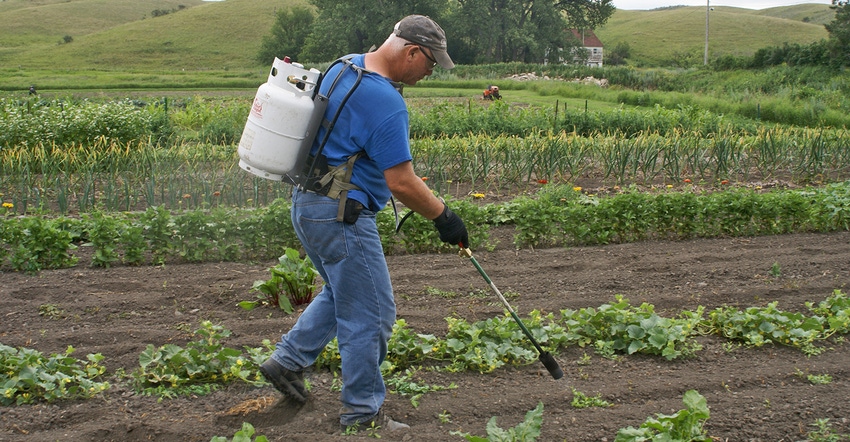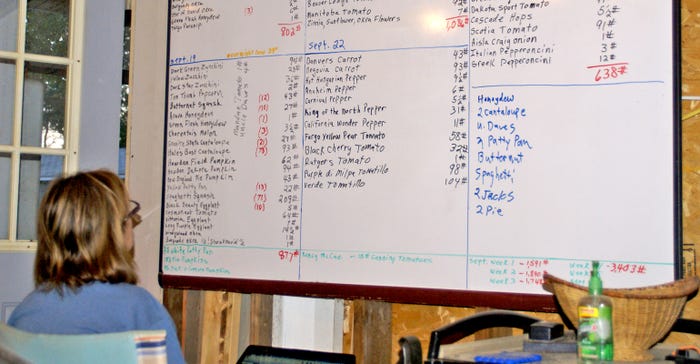March 6, 2017

There’s a great demand for locally grown food in North Dakota, says Marvin Baker of North Star Farms, Carpio.
He and his wife, Ilene, operate an organic vegetable farm. They sell produce to their Community Supported Agriculture shareholders and to the public at farmers markets at the Minot Air Force Base and in the cities of Minot and Kenmare.
“Physically, this is very difficult work,” Marvin says. “It can be rewarding because you’re producing healthy food consumers want and you’re working outside. But there are times when it’s very demanding.”
The couple started the farm in 2004, buying a condemned house on two and a half acres. Ilene, who worked alongside Marvin in the fields for the first few years, now works off the farm. Her income is a significant part of the family budget, but the farm has always been self-sustaining.
In 2009, the Bakers received a $20,000 grant from the Entrepreneurial Center for Horticulture at Dakota College in Bottineau to build a passive solar greenhouse. The first of its kind in North Dakota, the greenhouse allows the Bakers to start seedlings rather than having to purchase them. The 24-by-40-foot greenhouse has three rows of shelving and is covered with two layers of 6-millimeter plastic.
On his fields, Marvin plants a winter rye/legume cover crop mix, broadcasting the seed right after harvest, so the soil is covered over winter and has living roots in it as long as possible.
“In late spring I plow under that plant litter from the cover crop,” Marvin says. “The organic material serves as our fertilizer to build soil organic matter.”
Marvin mulches fields to help preserve soil moisture. He has experimented with flood irrigation but wasn’t happy with the results.
Although it keeps him very busy from the first Saturday of July through the end of October, Marvin does all the work of harvesting and selling.
“We don’t just fill a cardboard box with produce, set it on a table and expect people to buy it. We make sure the produce is nice and clean, and presented in an eye-appealing manner. We also take time to give customers a bit of information about what they’re buying. They’re not interested in a lot of detail, but they often have some questions about the food.”
Marvin also gives customers the opportunity to comment on their satisfaction with the products they purchase and ask questions about organic products they would like to buy.
“We maintain a customer email list, and some of our customers have been with us as long as we’ve been in business,” Marvin says.

HARVEST TALLY: Ilene Baker checks the North Star Farms harvest board as she works in the office. The daily harvest of vegetables is listed on the board.

North Star Farms is an Entrepreneurial Center for Horticulture demonstration site. In 2015 and 2016, North Star Farms was one of 10 trial sites for Northern Plains Sustainable Ag Society’s Farm Breeding Club in North Dakota and Montana. The data from the trials will help identify the varieties of onions and lettuce most likely to thrive across the northern Great Plains, be the most nutritious and provide the best marketing appeal.
“The Sedona [yellow] and Cabernet [red] onions we’ve grown several years show a lot of promise,” Marvin says.
The Bakers grow some unusual crops. This year, they are producing peanuts. They have been growing a cotton variety called Red Foliated. The 2017 growing season will be their fourth consecutive year for cotton. Marvin says it’s a novelty crop, but over time it may have promise as the plants adapt to the climate.
“Right now, in Minot, it’s all the rage to buy local and buy from the farm,” Marvin says. “I’m not certain why people have such a desire to buy locally grown foods, but we are happy to continue meeting that need.”
For more information about North Star Farms, see northstarorganic.com.
Sorensen is from Yankton, S.D.
About the Author(s)
You May Also Like




